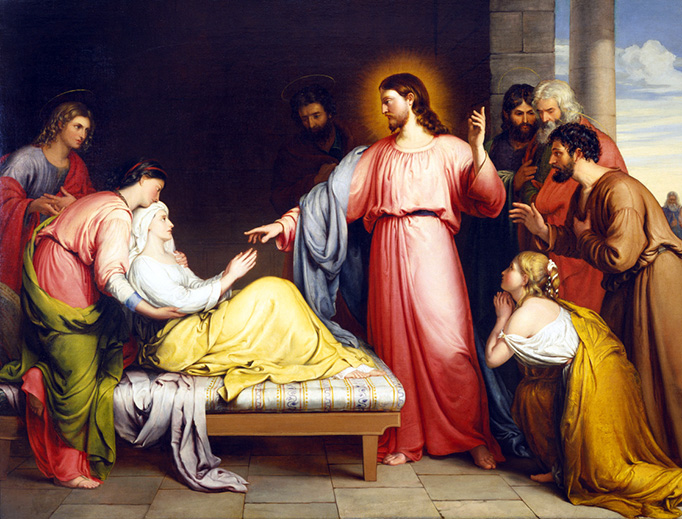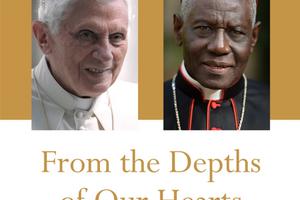St. Peter’s Marriage and Priestly Celibacy
“Now Simon’s mother-in-law lay sick with a fever, and immediately they told him of her. And he came and took her by the hand and lifted her up, and the fever left her; and she served them.” (Mark 1:30-31)

Luke 18:28-30 (RSV) And Peter said, “Lo, we have left our homes and followed you.” [29] And he said to them, “Truly, I say to you, there is no man who has left house or wife or brothers or parents or children, for the sake of the kingdom of God, [30] who will not receive manifold more in this time, and in the age to come eternal life.”
Matthew 19:27 Then Peter said in reply, “Lo, we have left everything and followed you. What then shall we have?” (cf. Mk 10:28)
Mark 1:29-31 And immediately he left the synagogue, and entered the house of Simon and Andrew, with James and John. [30] Now Simon's mother-in-law lay sick with a fever, and immediately they told him of her. [31] And he came and took her by the hand and lifted her up, and the fever left her; and she served them.
St. Peter referred to leaving “everything” in order to be Jesus’ disciple, and Jesus clearly recognizes the propriety of leaving even family (“house or wife or brothers or parents or children”) in some instances of radical discipleship.
We don’t rule such heroic renunciation out altogether. Catholics assume — unless Peter was a widower, which is also possible — that it was a mutual consent between Peter and his wife to separate, in order for him to engage in ministry with Jesus. This is not a wicked and involuntary separation, where the spouse resists it. Otherwise Jesus could never sanction such a thing. St. Paul refers to voluntary marital separation:
1 Corinthians 7:5 Do not refuse one another [i.e., sexually — from the preceding context] except perhaps by agreement for a season, that you may devote yourselves to prayer; but then come together again, lest Satan tempt you through lack of self-control.
It might be a bit like musicians going out on tour. Often they leave their families, for months at a time. At other times (while touring), they are joined by their wife and maybe children.
Secondly, we also see another related passage:
Matthew 1:24-25 (NRSV) . . . Joseph . . . took her as his wife, but had no marital relations with her until she had borne a son . . .
This would involve probably six months, bare minimum. We don’t know at what stage he was aware that she was pregnant. The word “until” does not necessarily imply that Mary and Joseph had sex after Jesus was born, as is often argued. Even Calvin and Luther agree with the Catholic view of perpetual virginity and vigorously defend it.
Protestants who reject the perpetual virginity of Mary need to be asked why Joseph abstained for the entire pregnancy if in fact he had marital relations with the Blessed Virgin Mary after Jesus’ birth.
Taking all the relevant Scriptures into account, it can be maintained that St. Peter left his family (by mutual agreement) to serve with Jesus. But he was (possibly) later accompanied by his wife on at least some missionary trips (1 Cor 9:5).
Even then, however, it is not absolutely certain, because in the same chapter Paul argues strongly in favor of the rights of Christian workers to receive wages for their work, yet he refuses to accept such remuneration himself (he made tents). In other words, he renounced that to which he had a perfect right, for the sake of the gospel (see 1 Cor 9:12-23). This is heroic service to God — above and beyond the call of duty; what Catholics call “the evangelical counsels.”
Likewise, it is conceivable (I don’t assert it as a fact) that Peter could have done the same vis-a-vis his wife, and with her consent (1 Cor 7:5), since the language in 1 Corinthians 9:5 is also concerned with “rights.”
During the time Peter was with Jesus, the Bible never mentions his wife traveling with the disciples, which is strange (if this is true), since it mentions many other women (several by name) who were connected with the disciples, traveled with them, and who helped support them financially (see, e.g., Mt 27:55-56; Mk 15:40-41; Lk 8:1-3, 23:49, 55, 24:10, 22). This is a surmise, but a permissible deduction from the biblical data.
Celibacy of priests (which I’ve vigorously defended many times!) is not an unchanging dogma, and it’s not required in Eastern Catholicism. In earlier centuries, there were more married priests, even in the Western Catholic Church, and the Bible refers to married bishops also:
1 Timothy 3:1-5 (RSV) The saying is sure: If any one aspires to the office of bishop, he desires a noble task. [2] Now a bishop must be above reproach, the husband of one wife, temperate, sensible, dignified, hospitable, an apt teacher, [3] no drunkard, not violent but gentle, not quarrelsome, and no lover of money. [4] He must manage his own household well, keeping his children submissive and respectful in every way; [5] for if a man does not know how to manage his own household, how can he care for God’s church?
Titus 1:5-7 This is why I left you in Crete, that you might amend what was defective, and appoint elders in every town as I directed you, [6] if any man is blameless, the husband of one wife, and his children are believers and not open to the charge of being profligate or insubordinate. [7] For a bishop, as God's steward, must be blameless; he must not be arrogant or quick-tempered or a drunkard or violent or greedy for gain,
If Paul’s intention was to refer only to widowers, or to forbid marriage to the bishop altogether, surely — I would contend — these texts wouldn’t read as they do. They casually assume that a bishop would have a wife and children (just as 1 Tim 3:12 assumes about deacons).
Therefore, on biblical grounds, marriage is perfectly compatible with being a priest or a bishop and celibacy is not intrinsic or essential to these offices.

















